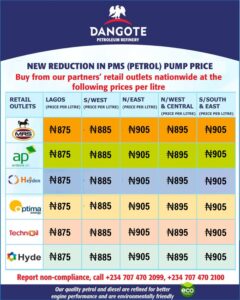In a groundbreaking move that has sparked widespread discussion across Nigeria, the Dangote Refinery has announced a significant reduction in petrol prices by N15 per litre, effective immediately. This price cut brings the cost of petrol to a range of N875 to N905 per litre, depending on location. As the nation’s largest refinery and a key player in the energy sector, Dangote’s decision is poised to have far-reaching implications for consumers, businesses, and the broader Nigerian economy.
Understanding the Price Slash
The Dangote Refinery, located in the Lekki Free Zone in Lagos, has been a transformative force in Nigeria’s oil and gas industry since it commenced operations. With a capacity to process 650,000 barrels of crude oil per day, it is Africa’s largest refinery and has been positioned as a solution to Nigeria’s chronic fuel importation challenges. The recent announcement of a N15 per litre reduction in petrol prices is a bold step that underscores the refinery’s commitment to affordability and accessibility of petroleum products.
The new price range of N875 to N905 per litre reflects variations based on geographical location. These differences are primarily due to transportation and distribution costs, which tend to be higher in remote or less accessible regions. For instance, urban centers like Lagos and Abuja may see prices closer to the lower end of the spectrum (N875), while areas farther from the refinery or with logistical challenges could experience prices closer to N905. This tiered pricing structure is not uncommon in Nigeria’s fuel market, where transportation costs significantly influence retail prices.

Why the Price Cut Matters
This price reduction comes at a critical time for Nigeria, where fuel costs have long been a contentious issue. Over the past few years, Nigerians have grappled with fluctuating petrol prices, often driven by global crude oil prices, exchange rate volatility, and the removal of fuel subsidies. The subsidy removal in 2023, under President Bola Tinubu’s administration, led to a sharp increase in petrol prices, placing significant financial strain on households and businesses. Against this backdrop, Dangote’s decision to lower prices offers a glimmer of relief for millions of Nigerians.
For Consumers
For the average Nigerian, the N15 per litre reduction translates to tangible savings, particularly for those who rely heavily on petrol for transportation, power generation, and small-scale businesses. For example, a commuter who fills a 40-litre fuel tank will save N600 per fill-up. While this may seem modest, the cumulative impact for daily commuters, commercial drivers, and households using petrol-powered generators is significant, especially in a country where many live on tight budgets.
For Businesses
Businesses, particularly those in the transportation and logistics sectors, stand to benefit immensely. Lower fuel prices reduce operational costs for transport companies, which could lead to lower fares for passengers and reduced costs for goods transportation. Small and medium-sized enterprises (SMEs) that rely on generators due to Nigeria’s unreliable power supply will also see reduced overhead costs, potentially boosting profitability or enabling them to lower prices for consumers.
For the Economy
On a macroeconomic level, the price reduction could have a stabilizing effect. Fuel prices are a key driver of inflation in Nigeria, as they influence the cost of goods and services across the board. By lowering petrol prices, Dangote Refinery may help curb inflationary pressures, providing some relief to an economy that has been grappling with high inflation rates. Additionally, the move could stimulate economic activity by increasing disposable income for consumers and reducing input costs for businesses.
The Role of Dangote Refinery in Nigeria’s Energy Landscape
To fully appreciate the significance of this price cut, it’s worth examining the broader role of the Dangote Refinery in Nigeria’s energy sector. For decades, Nigeria, despite being Africa’s largest oil producer, has relied heavily on imported refined petroleum products due to the underperformance of its state-owned refineries. This dependence has exposed the country to global oil price volatility and put pressure on its foreign exchange reserves.
The Dangote Refinery was conceived to address this paradox by enabling Nigeria to refine its crude oil domestically. Since its commissioning, the refinery has not only reduced Nigeria’s reliance on fuel imports but also positioned the country as a potential exporter of refined petroleum products to other African nations. By producing high-quality petrol that meets international standards, the refinery has introduced greater competition into the market, challenging the dominance of imported fuel and driving down prices.
The N15 price slash is a testament to the refinery’s operational efficiency and economies of scale. Unlike smaller players, Dangote’s massive production capacity allows it to reduce costs and pass savings on to consumers. Furthermore, the refinery’s ability to source crude oil locally eliminates the need for costly imports, further driving down production costs.
Factors Behind the Price Variation
The variation in petrol prices (N875 to N905 per litre) across different locations is an important aspect to unpack. Several factors contribute to these differences:
-
Transportation Costs: The cost of transporting fuel from the refinery in Lagos to various parts of the country significantly impacts retail prices. Areas closer to Lagos, such as Ogun and Oyo states, benefit from lower transportation costs, while northern and eastern states face higher logistics expenses.
-
Distribution Networks: The efficiency of fuel distribution networks varies across regions. In some areas, inadequate infrastructure or bottlenecks in the supply chain can lead to higher costs, which are passed on to consumers.
-
Market Dynamics: Local market conditions, including competition among fuel stations and regional demand, can influence pricing. In highly competitive urban markets, stations may keep prices closer to the lower end to attract customers.
-
Regulatory Factors: While the Nigerian government has deregulated the downstream oil sector, regional differences in taxes, levies, or operational costs for fuel stations can contribute to price variations.
Public and Industry Reactions
The announcement of the price cut has generated a buzz across Nigeria, with reactions pouring in from consumers, industry stakeholders, and policymakers. On platforms like X, Nigerians have expressed a mix of optimism and cautious hope. Many commend Dangote Refinery for taking a consumer-friendly step, while others are calling for further reductions to align with global oil price trends. Some users have also raised questions about the sustainability of the price cut, given the volatility of crude oil prices and the naira’s exchange rate.
Industry experts view the move as a strategic play by Dangote to solidify its market dominance. By offering competitive prices, the refinery is likely to capture a larger share of the market, putting pressure on other suppliers and importers. However, some analysts caution that the price reduction could strain smaller players who may struggle to match Dangote’s pricing, potentially leading to market consolidation.
What’s Next for Nigeria’s Fuel Market?
While the N15 price slash is a welcome development, it’s worth considering what lies ahead for Nigeria’s fuel market. Here are a few key points to watch:
-
Sustainability of the Price Cut: The longevity of the price reduction will depend on factors like global crude oil prices, exchange rate stability, and the refinery’s operational costs. If these variables remain favorable, Dangote may maintain or even deepen the price cut.
-
Impact on Competition: The price reduction could intensify competition in the downstream sector, forcing other players to lower their prices or improve service quality to remain competitive.
-
Potential for Further Reforms: The success of Dangote’s pricing strategy could encourage the government to implement further reforms in the energy sector, such as improving distribution infrastructure or incentivizing local refining.
-
Export Opportunities: As Dangote Refinery ramps up production, Nigeria could become a net exporter of refined petroleum products, boosting foreign exchange earnings and reducing pressure on the naira.
Join our Whatsapp channel to stay updated always!


